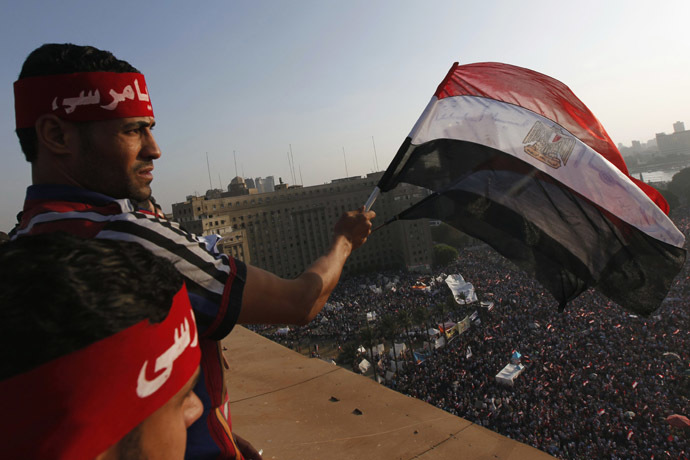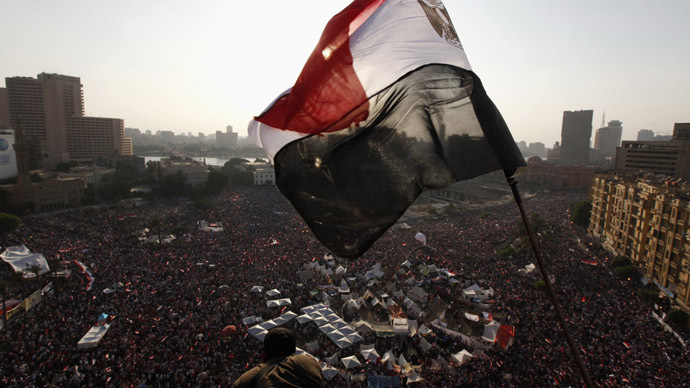Millions spilled out on to the streets of Egypt to demand the resignation of President Mohamed Morsi on the first anniversary of his inauguration, with sporadic outbreaks of violence leaving over a dozen dead and hundreds injured.
Click here for RT’s live updates on the Egyptian protests
On Monday, protesters stormed and ransacked the Cairo headquarters of Morsi's Muslim Brotherhood group. The HQ was the scene of violent overnight clashes between armed pro-government supporters barricaded inside the building and young protesters, who attacked the building with Molotov cocktails and rocks.
The Muslim Brotherhood said it is considering setting up self-defense unites to curb the violence following the storming of their headquarters, with Gehad El-Haddad, spokesman of the Islamist movement, claiming a red line of violence had been crossed.
At least eight people have been killed outside the building since Sunday, while 16 have died nationwide and 781 more have been injured in the mass protest.
The opposition released a statement early on Monday demanding President Mohamed Morsi step down by Tuesday at 5pm, with four Egyptian ministers resigning from Morsi’s cabinet to show solidarity with the protesters.
The movement also called on “police, army and judiciary” to support the people’s will. If Morsi fails to resign by Tuesday, civil disobedience will continue throughout unabated.
"It is the biggest protest in Egypt's history," a military source told AFP on condition of anonymity.
From early on Sunday, throngs streamed towards Tahrir Square in Cairo – the birthplace of the protests that displaced former president Hosni Mubarak in 2011 – under the rallying cry of “Leave, Morsi! Leave!”. The organizers, an activist movement called Tamarod, or Rebellion, asked demonstrators – who include pro-democratic secularists, religious minorities, and those suffering in Egypt’s stuttering economy – to leave their party allegiances at home, and bring only national flags to the rally.
“Morsi you have split the people!” chanted the crowd, with some holding placards saying “Freedom to Egypt!”. On the edges of the square banners declared “No Muslim Brotherhood members allowed beyond this point”.

Although, the organized demonstration was scheduled for the evening, even by mid-afternoon, several hundred thousand people squeezed into the increasingly tight space. Tamarod says it is expecting up to 7 million people to eventually join the long-planned protest, with large demonstrations scheduled in every significant population center.
Tamarod says that since April it has gathered more than 22 million signatures demanding Morsi’s resignation, far more than the 13 million votes the long-time Muslim Brotherhood member received in his narrow run-off victory a year ago. Organizers say the president must quit immediately and dissolve the Islamist-dominated Shura Council, the upper chamber of parliament that has been in charge of lawmaking for the past year.
Additionally, protesters are appealing for a re-start on the suspended drafting of a new constitution. Failure to agree on a new founding charter in the wake of Mubarak’s toppling has contributed to the gridlock that has paralyzed the country’s political institutions. A new parliamentary election is also on the list of demands, after the Supreme Court dismissed the pro-Morsi lower house of the legislative assembly last year immediately following the vote, for alleged procedural violations in the run-up to the balloting.
On Sunday night, anti-Morsi activists torched the office of the Freedom and Justice Party (FJP), the Muslim Brotherhood’s political arm, in the city of Beni Suef, and one man was killed in a later street battle between pro and anti-Morsi activists in the same city.
Anti-Morsi protesters also tried to storm the heavily-fortified headquarters of the Muslim Brotherhood on Sunday evening, using shotguns, rocks and firebombs, but were repelled. At least five other offices of the FJP and the Brotherhood have been set on fire in the past week.
Opposition activists have successfully blocked off several highways and railroads between major urban centers. At some sites state media reported that police officers joined in chanting anti-Morsi slogans with the protesters. Senior interior security force officers have openly clashed with Morsi, and the police has said that it “lacks manpower” to protect Muslim Brotherhood properties around the country, despite repeated attacks.
Despite rising tension, Morsi has decisively rejected the protesters’ calls.
"If we changed someone in office who was elected according to constitutional legitimacy – well, there will be people opposing the new president too, and a week or a month later they will ask him to step down,” the president told the Guardian newspaper on the eve of the demonstrations.
He has also dismissed the crowd as “remnants of the old regime”, and the protesters as “paid-up thugs.”
“Any revolution has its enemies and there are some people who are trying to obstruct the path of the Egyptian people towards democracy,” Morsi summed up.
This is unlikely to pacify those in Tahrir Square crying out for a “second revolution”.
Opposition figures say Morsi has mishandled the mandate handed to him a year ago by attempting to monopolize power, sidelining all those who do not share his religious and political vision. They cite the insertion of divisive Islamic articles into the proposed text of the new constitution, en-masse appointment of Muslim Brotherhood officials to key posts, and a decree that removed the Supreme Court’s authority to challenge the president’s decisions as some of the major missteps.
They also say that the president has failed to revive the economy. Despite GDP growth of 2.2 percent last year, the country has been plagued by electricity and fuel shortages that have seen huge queues form outside petrol stations. Income in tourist areas has also plummeted after two years of instability and anti-Western pronouncements by Morsi-supporting radical clerics.
“We gave Morsi the permit to drive; he doesn't know how to drive. The country is decaying and is failing, this is not Egypt and this is not the revolution,” Mohammed ElBaradei, Nobel Peace Prize winner, and opposition politician said ahead of the rallies.
With strident language on both sides, the stand-off is unlikely to resolve neatly.
Since Friday, Morsi supporters have camped outside a mosque in Nasr City, on the other side of Cairo. Brandishing green Islamic flags, some were wearing home-made armor, and most told journalists they would be ready to physically fight for the “legitimate” president.
“If there is treason, we
are here,” warned Ahmed Abdel Azeez, a Brotherhood member, in
an interview with New York Times.
The army, which stepped in to temporarily assume power following the clashes that followed Mubarak’s unseating, said it will not tolerate an “attack on the will of the people” or allow Egypt to enter “a dark tunnel of conflict”. The ambiguous remarks, uttered by defense minister Abdel Fattah al-Sisi, have been taken to mean by local media that the army will not interfere in the course of the protests, unless direct confrontation between the conflicting factions takes place.
On Sunday, army helicopters flew over the Cairo skyline and heavier than usual army cordons were deployed around key sites, including government buildings and the Suez Canal. Mechanized infantry units have been placed around Tahrir Square itself, and all hospitals in major cities are on standby.
The country’s land borders have also been sealed.
US, Qatar and Belgium are amongst states that have officially revealed that they are withdrawing their diplomats for the duration of the showdown. On Sunday Cairo airport was crowded with foreign nationals and wealthy Egyptians attempting to leave the country on predominantly fully-booked flights.

